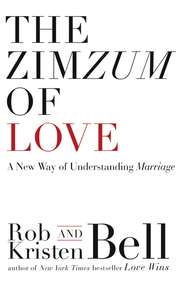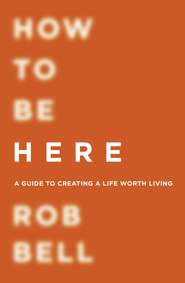По всем вопросам обращайтесь на: info@litportal.ru
(©) 2003-2024.
✖
The Complete Rob Bell: His Seven Bestselling Books, All in One Place
Автор
Год написания книги
2018
Настройки чтения
Размер шрифта
Высота строк
Поля
Paul goes so far as to insist in another letter that if we are having this new kind of transforming experience with Christ in which we are taking on a new identity, we are literally now a “new creation.”9 (#ulink_d2fa768e-dd81-5d98-9092-5fea1d8da8e4)
I am being remade.
I am not who I was.
I am a new creation.
I am “in Christ.”
When God looks at me, God sees Christ, because I’m “in” him.
God’s view of me is Christ.
And Christ is perfect.10 (#ulink_9710ffd2-154e-56d9-8352-b7639a7e5f22)
This is why Paul goes on to say, “Therefore, as God’s chosen people, holy and dearly loved . . . ”11 (#ulink_b3c4c42b-aebb-5ded-a8d7-7693587ed75a)
Did you catch that word in the middle?
Holy.
Not “going to be holy someday.” Not “wouldn’t it be nice if you were holy, but instead you’re a mess.” But “holy.”
Holy means pure, without blemish, unstained.
In these passages we’re being told who we are, now.
The issue then isn’t my beating myself up over all of the things I am not doing or the things I am doing poorly; the issue is my learning who this person is who God keeps insisting I already am.
Notice these words from the letter to the Philippians: “Let us live up to what we have already attained.”12 (#ulink_cc08909b-4ff7-5d91-9e7e-d76794dbab6f)
There is this person who we already are in God’s eyes. And we are learning to live like it is true.
This is an issue of identity. It is letting what God says about us shape what we believe about ourselves. This is why shame has no place whatsoever in the Christian experience. It is simply against all that Jesus is for. As the writer to the Romans put it, “Therefore, there is now no condemnation for those who are in Christ Jesus.”13 (#ulink_0fc41733-c9ec-5a4a-84b2-46eaeeb74a35)
None.
No shame.
No list of what is being held against us.
No record of wrongs.
It has simply been done away with.
It is no longer an issue.
Bringing it up is pointless.
Beating myself up is pointless.
Beating others up about who and what they are not is going the wrong direction. It is working against the purposes of God. God is not interested in shaming people; God wants people to see who they really are.
“Let us live up to what we have already attained.”
I am not who I was.
You are not who you were.
Old person going away, new person here, now.
Reborn, rebirthed, remade, reconciled, renewed.
Jesus put it this way: “You are in me and I am in you.”14 (#ulink_49d52e54-f05b-5806-b693-f11c6cb4a8aa)
So when the first Christians went all over the Roman Empire telling people the Jesus message, they spent most of their time explaining who people are from God’s perspective. Who we already are. They insisted that people can live a new life, counting ourselves “dead to sin but alive to God.”15 (#ulink_e3ef172a-9be2-5fad-ab49-cd5876140e65)
When we stumble and fall back into old patterns, we call them what they are: old patterns. Old ways. Old habits of the old person.
Something new is happening inside us.
Jesus said that as this new reality takes over our hearts and lives and minds and actions, we are crossing over “from death to life.”16 (#ulink_5736f820-7791-5ff2-9dd1-bac46540f7b0) He called this new kind of life “eternal life.” For Jesus, eternal life wasn’t a state of being for the future that we would enter into somewhere else; it is a quality of life that starts now.
Eternal life then is a certain kind of life I am living more and more now and will go on forever.17 (#ulink_c2e30c3a-d086-570e-ae37-55a4da025e30) I am living more and more in connection with God, and I will live connected with God forever.
This has huge implications for when I do stumble, when I sin and the old person comes back from the dead for a few moments.
I admit it.
I confess it.
I thank God I am forgiven.
I make amends with anyone who has been affected by my actions.
And then I move on.
Not because sin isn’t serious, but because I am taking seriously who God says I am. The point isn’t my failure; it is God’s success in remaking me into the person he originally intended me to be.
God’s strength, not mine.
God’s power, not mine.
So what does this mean for the Christian life? To begin, Christians are people learning who they are in Christ. We are being taught about our new identity. Do you see how deeply this new identity affects the life of a community? I heard a teacher say that if people were taught more about who they are, they wouldn’t have to be told what to do.18 (#ulink_a6b52b8e-6db0-5b57-b087-1936de5012e7) It would come naturally. When we see religious communities spending most of their time trying to convince people not to sin, we are seeing a community that has missed the point. The point isn’t sin management.19 (#ulink_044e98d3-58b0-5bd9-b6f3-62a181054e96) The point is who we are now.
Often communities of believers in the New Testament are identified as “saints.” The word saints is a translation of the Greek word hagios, which means “holy or set apart ones.” Those who are “in Christ.” Not because of what they have done, but because of what God has done. There is nothing we can do, and there is nothing we ever could have done, to earn God’s favor. We already have it.
Jesus tells a parable about a young son who leaves home, hits bottom, and returns in shame. His father sees him from far off, runs to him, embraces him, and announces a party in honor of his homecoming.











